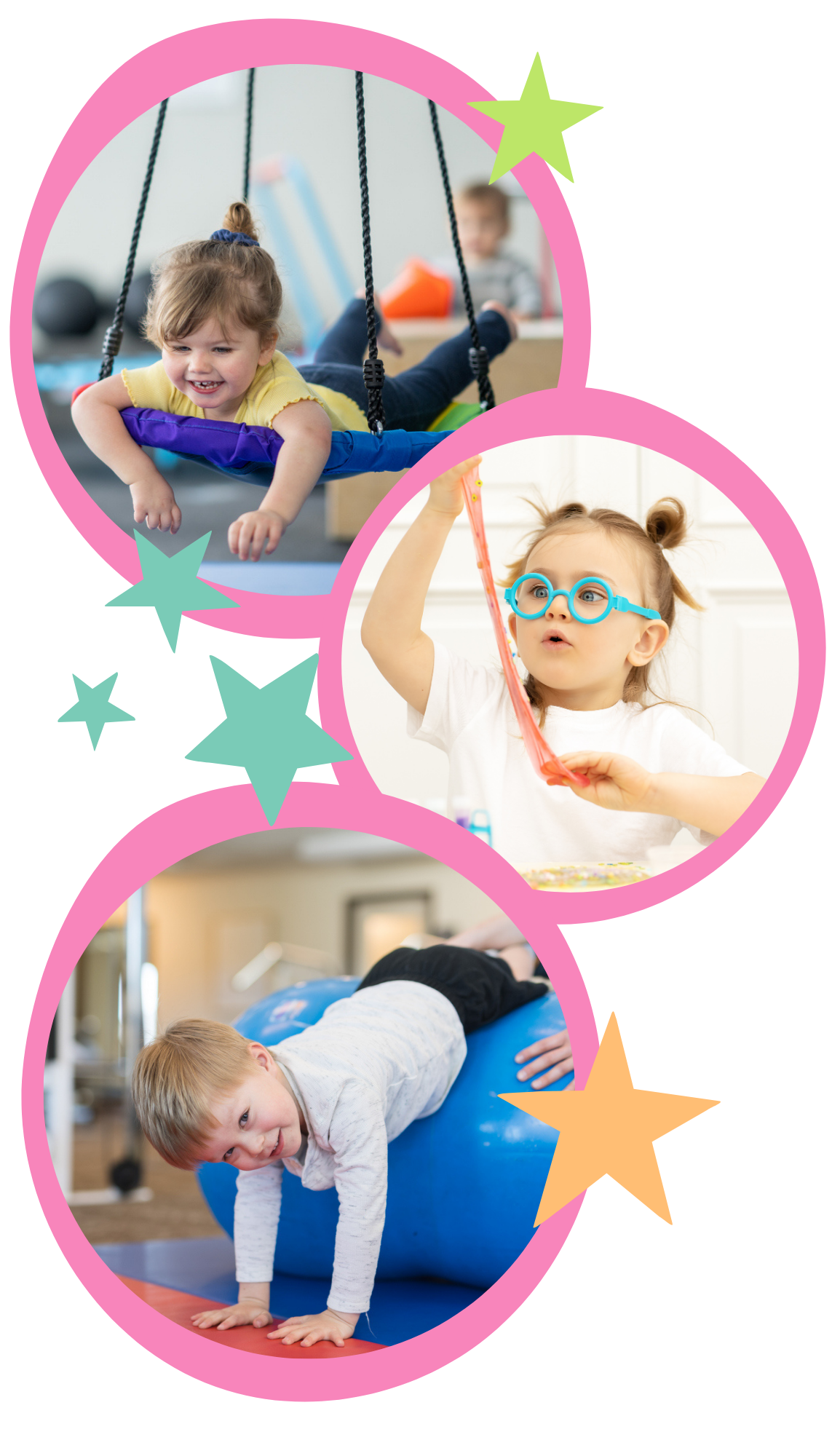Pediatric Therapy Services
Serving Children and Families in Maplewood and Plymouth, MN
Developmental Delays • Fine & Gross Motor Development • Sensory Processing • Self-Regulation • Handwriting • Self-Care Skills • Picky Eating • Oral Motor Delays • Pediatric Feeding Disorders • Muscle Weakness • Mobility Challenges • Gait Abnormalities • Musculoskeletal Conditions • Joint Dysfunction & Pain • Torticollis & Plagiocephaly • Bowel & Bladder Issues • Speech & Language Disorders • School Readiness Skills
Our Approach to Therapy
At Children’s Theraplay, we work hard to make therapy feel like play! We’ll embed your child’s goals into their favorite activities, so they’ll learn new skills while having fun.
As trauma-informed occupational, physical, and feeding therapists, we focus on building trust before building new skills. We’ll use co-regulation strategies and provide calm, responsive support to help your child feel safe and supported at all times— especially when things get tough or don’t go their way.
We also invite parents into therapy, so you’ll always know how to support your child’s growth at home. Together, we’ll turn play into powerful progress!
Evaluations to Guide Therapy
We’ll begin by assessing your child’s skills to understand their strengths and needs. Our evaluations include:
Review of medical and developmental history
Review of intake questionnaires and inventories
Comprehensive standardized testing
Clinical observations
Parent consultation
Once the evaluation is complete, we'll determine together whether your child will benefit from therapy and create a care plan to achieve your family’s goals.
What We Offer
Occupational Therapy for Kids
A child’s jobs, their "occupations", are to grow, play, learn, socialize, and gain independence— so our occupational therapy (OT) sessions are designed to help your child do just that! At Children’s Theraplay, our play-based occupational therapy sessions may focus on:
Sensory processing & sensory integration
Self-regulation, behavior, & self-advocacy
Body awareness & motor planning/praxis to imitate & learn new skills
Play, socializing, & forming meaningful relationships
Attention, memory, & problem solving
Self-care for daily routines (dressing, eating, bathing, sleeping, toileting)
Body coordination, balance, strength, & flexibility
Gross & fine motor coordination
Visual-motor & eye-hand skills, visual perception
Pre-writing & handwriting skills
Preschool & kindergarten readiness
School, activity, & family participation
-
Delayed motor milestones
Lack of independence with daily activities
Musculoskeletal conditions
Trauma history
Global or multiple developmental delays
Visual-motor and visual perception problems
Poor eye-hand coordination
Decreased endurance
Ineffective hand strength
Distress with transitions & change
Limited play skills & insistence on the same play or control of play
Difficulty imitating actions & playing with others
Ineffective grasp & control of tools
Difficulty using appropriate level of activity for sedentary & active tasks/play
Self-regulation problems
Inappropriate force— too much or too little— for the task
Inconsistent engagement & interaction with others
Self-care skills are delayed or inconsistent
Avoids activities requiring balance, easily gets dizzy
-
Yes! We have advanced training in sensory integration, which allows us to help children process what they see, feel, taste, smell, and hear and make an adaptive response. We also focus on building interoception, or the ability to process sensations that come from inside the body— like hunger or the need to go potty.
Physical Therapy for Kids
At Children’s Theraplay, our physical therapists specialize in helping children develop, recover, and improve their physical abilities to experience life as fully and independently as possible. Whether your child needs support with meeting developmental milestones or managing pain, our pediatric PTs will help them:
Crawl, squat, walk, run, climb, play, and move with ease
Use whole-body coordination & gross motor skills for play
Improve balance & postural control to safely move
Develop strength & endurance for daily activities
Increase range of motion to move more freely
Physically keep up with other kids and family members
Participate in life more independently
-
Atypical gait patterns or gait anomalies (such as toe-walking)
Delayed motor milestones
Decreased endurance (quick to fatigue)
Decreased strength (weakness)
Frequent falling, poor balance, clumsiness
Musculoskeletal conditions
Low or high muscle tone
Hypermobility
Joint dysfunction and pain
Global or multiple developmental delays
Genetic, neurological, and other conditions
Torticollis and plagiocephaly
Physical recovery from illness, injury, or surgery
Bowel and bladder issues
-
Yes! Our physical therapists have specialized training in Facilitation of Joint Movement (FJM), which is especially effective in addressing challenges like torticollis.
-
Yes! We are trained in the following manual therapies:
Fascial Counterstrain (FCS): A gentle, hands-on manual therapy technique that releases tightness and restrictions in the fascia around a child’s muscles, organs, and nerves.
Facilitation of Joint Movement (FJM): A micro-manual therapy technique that restores a child’s natural patterns of joint movement. It’s used to treat joint dysfunction and pain that causes false weakness and secondary spasm.
-
Dynamic Movement Intervention (DMI) is a therapeutic technique used to treat children with delayed gross motor milestones, to improve automatic response to the environment through specific dynamic exercises that promote muscle activation, postural control, and strength. Due to the hands-on nature of this intervention, DMI is most effective with children 5 years and under, but the principles can be applied for children of all ages.
Pediatric Feeding Therapy
Feeding therapy is offered through our occupational therapy program and can be incorporated into a comprehensive OT treatment plan.
Eating is hard work! Our therapists help children overcome challenges that affect their ability to sit at the table, use utensils, and feel comfortable with food. Depending on your family’s goals, our feeding therapy sessions may focus on:
Building sensory and motor skills for effective feeding
Gradually exploring new foods without pressure
Gaining comfort with different textures, tastes, and smells
Reducing anxiety, choking, gagging, and coughing
Making mealtimes more enjoyable for the whole family
-
Feeding difficulties often start in infancy and early childhood, and might look like:
Poor weight gain, or even weight loss
Limited growth
Back arching, pulling away, and crying during breast/bottle feedings
Excessive drooling or poor lip closure
Difficulty transitioning between breast/bottle, purees, mixed textures, or solid foods
Only eating certain foods
Stress or avoidance when new foods are offered
Trust your intuition! If you feel your child is struggling with feeding or eating at any age, contact us for an evaluation.
-
No! Our goal is to help your child have positive experiences with food. Eating is one of the only things that a child can exercise strict control over when they feel like other things are out of control, so we can only help if your child feels safe, stress free, and in control.
-
The first thing we do is take the focus off of food, which dials down your child’s stress level.
Then, we use a combination of approaches that help build the underlying sensory and motor skills needed for feeding to be more successful. We use play-based, curious, gradual exploration of food to keep feeding positive and present a just-right challenge. By respecting boundaries while we work on underlying skills, we develop a safe space for your child to take risks with food.
We also experiment with simple strategies that you can try at home. We’ll work together every step of the way to bring the joy back to family mealtimes!
Speech Therapy
We partner with Associated Speech and Language Specialists (ASLS) for coordinated speech and language therapy services at our Maplewood and Plymouth clinics.
Although we are separate agencies, we practice out of the same clinic locations, bringing ease and convenience to our patients.
We Are Accepting New Patients!
Children’s Theraplay is accepting new patients. We specialize in trauma-informed occupational therapy, feeding therapy, speech therapy, and physical therapy for kids in Maplewood and Plymouth, MN.





